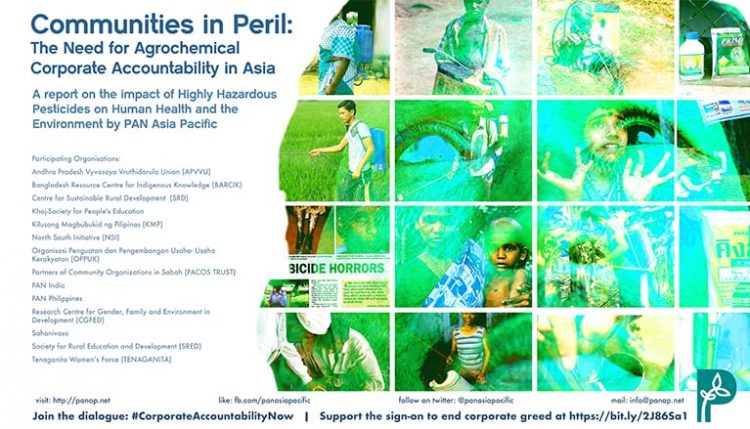PENANG, Malaysia – PAN Asia Pacific (PANAP) today released the results of its three-year, seven-country study on the impact of highly hazardous pesticides on people’s health and the environment. The report’s launching coincided with the commemoration of World Environment Day today by the United Nations (UN).
The study “Communities in Peril: The Need for Agrochemical Corporate Accountability in Asia” revealed that highly hazardous pesticides remain widely used in the countries surveyed which include Bangladesh, India, Indonesia, Malaysia, Pakistan, the Philippines, and Vietnam. Among others, it found out that pesticide containers – including those made out of plastic materials – are not being disposed of properly. The report also noted that small farmers commonly buy retailed pesticides stored in plastic bags.
“Improper disposal and the use of plastic containers show the myriad of ways of how the pesticide industry poisons our ecosystem and endangers public health. It’s double whammy. Pesticides by themselves are already hazardous. Plastics used to contain them, especially when improperly disposed, also do their own damage,” said PANAP executive director Ms. Sarojeni Rengam in launching the report that involved 2,025 farmers and plantation and agricultural workers including child workers as respondents.
This year’s World Environment Day has #BeatPlasticPollution as its theme, reiterating the urgency of new pledges from companies and governments worldwide to address plastic wastes. Unfortunately, as the recent PANAP report noted, the pesticide industry apparently is not doing its share as it fails to fulfill its responsibilities under the International Code of Conduct on Pesticide Management (the Code).
It is estimated that the world produces about 300 million tons of plastic a year – half of them used only once. Ocean pollution is a particular concern, with an estimated 4.8 million to 12.7 million metric tons of plastic materials ending up in the oceans annually, according to a study by the University of California Santa Barbara’s National Center for Ecological Analysis and Synthesis. A separate report by the International Pellet Watch found out that polythene (a common plastic) pellets found in beaches in some of the countries it studied contained compounds from pesticides.
The PANAP report disclosed the absence of a system to properly dispose unused pesticides, contaminated containers, and even personal protective equipment. About a third of the respondents surveyed by PANAP said that they just throw empty pesticide containers in the field; 18.9% said they burn the containers while 14.5% said they bury them, causing serious damage to the environment.
Many small farmers who need relatively smaller quantities of pesticides for their crops also buy in refill containers or clear plastic bags, which puts their health and the environment at risk of contamination, the report noted.
“The pesticide industry has the responsibility to ensure the proper disposal of pesticides and used containers. Government and industry should also cooperate to establish services to collect and safely dispose used containers,” Rengam stressed.
Conducted from 2015 to 2017, the report also showed how transnational agrochemical corporations violate a number of human rights, including those of women, children and indigenous people, and the rights to life and health – all in the drive to maximise corporate profit.
According to the PANAP report, seven out of 10 of all the respondents have been ill due to pesticide exposure. Commonly reported health issues include respiratory, skin, cardiovascular, gastrointestinal, EENT (eye, ear, nose, throat), and neurological problems.
“This situation is totally unacceptable. Pesticides are a serious human rights issue that is not being adequately addressed at national, regional or international levels. This latest analysis shows that international agreements and treaties are not working. Industry stewardship programmes are a sham,” said Dr. Meriel Watts, PANAP’s senior science and policy advisor.
The Penang-based group renewed its call on the global community to negotiate a global legally binding treaty that phases out highly hazardous pesticides and replace them with agroecology; that dismantles the power of TNCs over the UN, governments and farmers and holds industry accountable for the human and environmental impacts of their pesticides and containers; and that stops the double standards of countries banning pesticides but still manufacturing them for export.
“We urge all countries in the region to rapidly phase out highly hazardous pesticides and assist farmers to convert to agroecology – for the sake of the farmers and workers, their children, future generations, the environment, and society as a whole including the countries’ economies,” Dr. Watts said.
The results of the study were generated through PANAP’s Community Pesticide Action Monitoring (CPAM) as well as fact-finding missions. CPAM is a participatory action research approach to document and create awareness of pesticide impacts on human health and the environment. It involves community members who undertake the research, and encourages organizing and action. ###
Contact: Ms. Sarojeni Rengam, Executive Director, info@panap.net
join the dialogue: #CorporateAccountabilityNow
Support the sign-on to end corporate greed at https://bit.ly/2J86Sa1








Discussion about this post